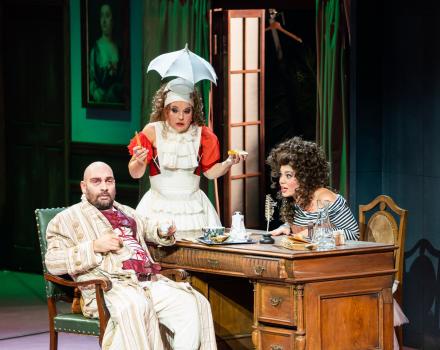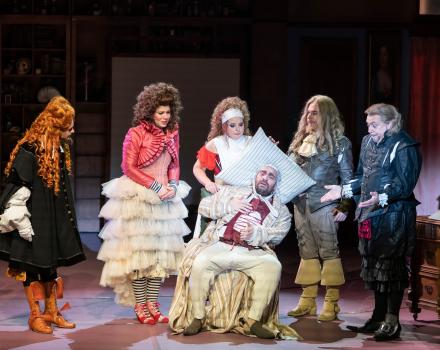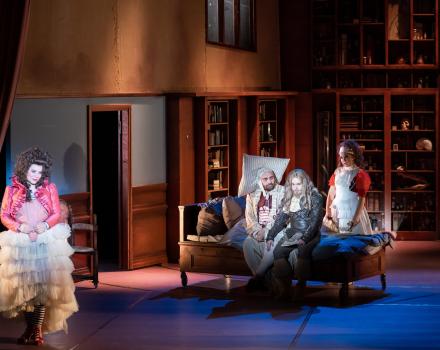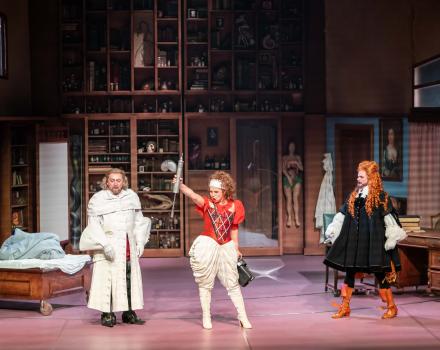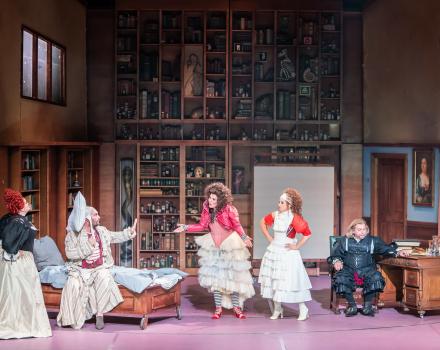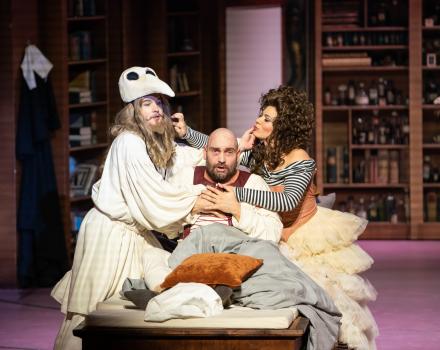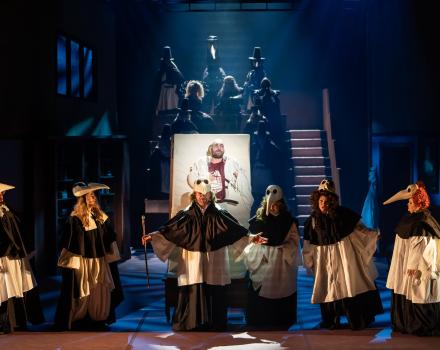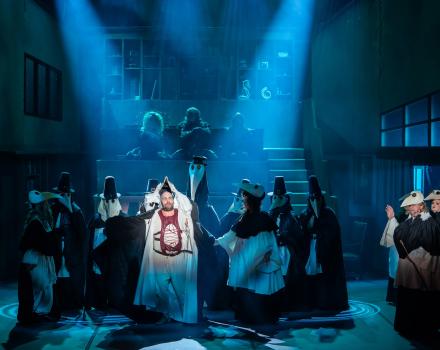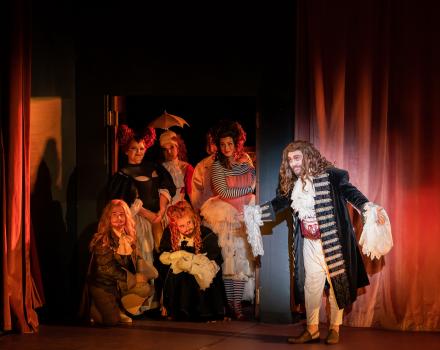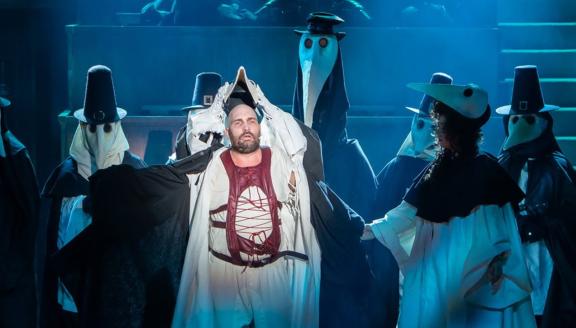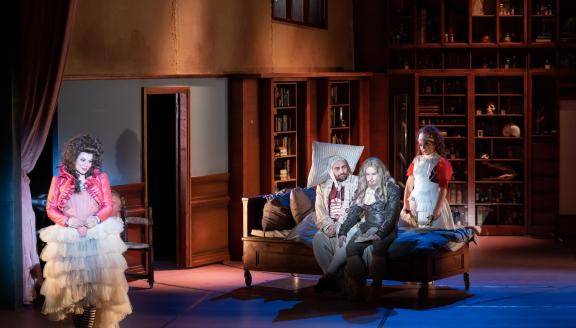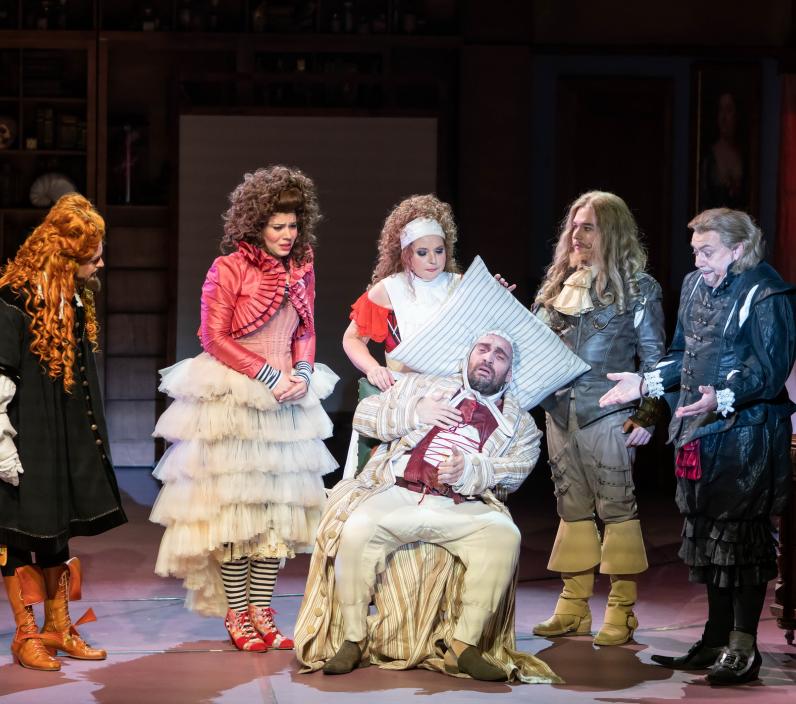

The wealthy Argan ‘enjoys’ poor health. Even though his daughter is in love with another man, he wants to marry her off to a medical dunce who can secure a lifetime of medical care for his father-in-law. A fake death scene finally teaches Argan where to put his trust.
Following the success of his previous works, this is the fourth opera by János Vajda to be staged at the Hungarian State Opera. Based on both Moliere's Le malade imaginaire and Mikhail Bulgakov's play about the French playwright, Vajda's new opera incorporates Moliere's life story, giving bass-baritone András Hábetler the rare opportunity to play the dual roles of Argan and Moliere.
Cast
|
Molière / Argan
|
András Hábetler
|
|---|---|
|
Béline
|
Bernadett Wiedemann
|
|
Angélique
|
Lilla Horti
|
|
Cléante
|
György Hanczár
|
|
Toinette
|
Éva Bátori
|
|
Dr. Purgon
|
István Rácz
|
|
Théophile
|
Gergely Biri
|
|
Louis XIV
|
Szilveszter Ókovács
|
| ... | |
|
Music
|
János Vajda
|
|---|---|
|
Conductor
|
János Kovács
|
|
Director
|
Máté Szabó
|
|
Sets
|
Renátó Cseh
|
|
Lighting
|
Dávid Barad
|
|
Costumes
|
Anni Füzér
|
|
Text
|
Szabolcs Várady, based on the comedies ‘The Imaginary Invalid’ by Moliere and ‘The Cabal of Hypocrites’ by Mikhail Bulgakov
|
|
English subtitles
|
Arthur Roger Crane
|
| ... | |
Video
The story
Prelude
Molière, the comedy writer, expresses his gratitude to King Louis XIV of France for accepting his troupe into his royal grace and watching their performance.
Act I
Argan, who imagines himself to be sick and who is portrayed by Molière himself, takes stock of the prices of the medicines he is required to take. Although he considers them too expensive, he devoutly believes in their efficacy. The servant Toinette appears on scene, who sees through Argan and tells him that she considers doctors to be nothing but frauds. Argan’s daughter Angélique tells Toinette that she is in love, even showing her the letter she received from young Cléante in which he proposed to her.
Argan tells Angélique that he wants to find her a suitor. The girl is happy until she finds out that they are not talking of the same young man: her father wants her to wed Théophile, the son of his doctor Purgot. Since his daughter resists the idea, Argan collapses, unconscious.
Argan’s wife Béline arrives. Her husband complains about Toinette, saying she refuses to believe his sicknesses, but the servant girl lies to Béline, saying she had just recommended that Argan send their daughter to a convent, which is in truth Béline’s desire. This immediately wins Béline over, who continues to protect Argan and care for him. And it has its results: the man intends to leave his entire fortune to his wife.
The young Cléante enters, saying that he is here to substitute Angélique’s singing teacher, who has become ill. Argan calls his daughter to the teacher, when Doctor Purgot and his son Théophile suddenly show up. Théophile, a feeble-minded medical student, turns to Argan, repeating a greeting he learned, and then faces Angélique to ask for her hand in marriage. But the girl incites a small rebellion, which is soon quelled by Argan. He asks the doctor to treat him. The doctor proposes that his son should examine Argan, whose diagnosis is the same as the one made by his father. Let the singing class start! Cléante and Angélique improvise a duet about two youngsters who cannot belong to each other because of a cold-hearted father. Argan doesn’t enjoy it, and he sends Cléante away.
This is followed by another storm brewed by the entry of Béline: Angélique resists the forced marriage, in response to which her mother would send her away to be a nun. Purgon is outraged, Théophile fails to comprehend the situation, and Toinette attempts to save what she can.
Interlude
Louis XIV issues a veiled threat to Molière for his Tartuffe, which puts the Church in a bad light. But he allows the writer to premiere his newest piece at the Palais Royal.
Act II
Toinette decides to save Angélique because the girl’s happiness is important to her. Argan arrives, feeling as if death is upon him now that even his beloved child has turned against him. Toinette tries to dissuade him from executing his plan, but he remains steadfast, falls ill, calls for a doctor, and exits. The two Purgots arrive, and Toinette makes them believe that Argan has been cured. The doctors leave, outraged. When Argan returns, Toinette acts distressed about the fact that the doctors have left. But she then reports the arrival of another, ‘miraculous’ doctor. Cléante enters dressed as a doctor: he examines Argan and meanwhile reveals his identity to Angélique. The boy comes up with a new diagnosis for everything that the Purgot pair said and recommends amputating one of Argan’s arms and poking out one of his eyes. He then leaves.
Argan sees through the ploy: Angélique is glad to see the new doctor because that means the young Purgot won’t come around anymore. At the earlier recommendation of his wife (and because he will allow only a doctor to marry into the family), Argan decides to send his daughter to a convent. So Toinette suggests that he should pretend to be dead so they can judge on the basis of Béline’s reaction how much she deserves to be fully trusted. When the wife arrives home, Toinette pretends to be in deep mourning, and tells her that Argan has passed away, to which the evil woman expresses her relief. When she wants to quickly collect her money, Argan suddenly ‘comes to life.’ Béline is surprised, tells him everything, and storms off. The miserable, disappointed Argan feels that the end has come. Cléante, still dressed as a doctor, comes at the most opportune time possible: Argan is so scared that he would rather be healed than be sick, and gives his daughter to the young man. According to Cléante, Argan would have done better to become a doctor himself.
Postlude
Molière falls out of favour with Louis XIV permanently because of his immorality. The writer and actor is broken and is barely able to start the finale to The Imaginary Invalid.
Finale
Molière, who is playing Argan, falls ill just before the doctoral title is conferred upon Argan. The play is interrupted.
Insights
Laughter suddenly turns to astonishment
Interview with composer János Vajda
Where did you get the idea to write an opera by creating an amalgam of Bulgakov’s and Molière’s pieces?
If one is a composer, one is wont to read almost everything as a libretto. As regards the origin of the opera, I first read Bulgakov’s novel Life of Monsieur de Molière. It lent itself that I should set Bulgakov’s play with an identical plot, The Cabal of Hypocrites to music, since it even references Molière’s The Imaginary Invalid. I quickly wrote the part with the doctoral conferment. But I was racked with doubt regarding the Bulgakov play and changed the original idea to put The Imaginary Invalid in the centre of the piece and to use an element from Bulgakov’s work, the relationship between Louis XIV and Molière, to connect the two. By nature, I am lazy, and it is difficult to convince myself to think things through with suitable depth, which is why I need someone to help me do so. In previous operas, I worked together with Katalin Györgyfalvay, so with her death in 2012, I considered my opera career to be finished. But then I spoke to director Gábor Székely, whom Katalin had used to consult, and that’s how I ended up contacting Diána Mátrai as dramaturg. The composing was greatly helped by the fact that she put the Bulgakov and the Molière works and the dialogues together and explained her ideas quite tenaciously. What she thought about it helped make my thinking productive. And Szabolcs Várady wrote a sensational libretto, which is very inspirational: it is good to listen to and to sing to.
What makes these old pieces relevant today?
The thread taken from the Bulgakov piece, the personal relationship between King Louis and Molière, which is the relationship of the artist to power, is an eternal topic: it has always been relevant and it always will be. This is an eternal conflict, an eternal connection that exerts its influence in one way or another. That is why this comedy is relevant. I have seen a number of performances of The Imaginary Invalid, and it has always been staged by lending strong darker tones to the original comedic nature of the piece. However, I had no intention of casting any shadows over Molière’s comedy: the scenes taken from Bulgakov offered enough darkness. Of course, there are overlaps, mainly musically, between the two threads. For example, in the first scene of act two, the music of Argan’s and Toinette’s monologues are strongly based on Molière’s dialogue with the King.
How much of your own experiences are behind the depiction of the relationship between power and the author?
I do not have any experiences that are as harsh as the ones in the opera. But still, one feels it when others do not like or resent something one does. Not as strongly perhaps, but one still encounters this type of thing.
You wanted a comedy, yet you end up ‘killing’ the comedy writer at the end of the opera...
I have no problem with enjoying a performance and then suddenly being left astonished. The opera is based on a structure mechanically broken down into two acts by the prelude, interlude, and postlude. It is my intent to not have an omnipresent serious drama, but to imbibe it with a strong impending sense that is headed towards and finally manifests itself as such. I can only hope that it works.
What motifs and stylistic elements does the work use?
It is possible to recognise recurring motifs, short segments, and musical characteristics, such as the music of the scene involving the King and Molière that I mentioned above. Sometimes I am criticised for relying too heavily on influences, but there are some that I myself don’t recognise... I am simply obliged to use certain musical materials because they are self-evident. The musical language I speak encompasses several centuries, and it includes folk music, Renaissance, Baroque, classical, and Romantic music, the music of the 20th century, and even pop music. Their stylistic elements belong to my vocabulary, and I have no wish to narrow that down. Anyone who recognises these will either be entertained or annoyed, but even those who are unable to identify its source may realise that they are hearing something that they might be familiar with.
Gallery




